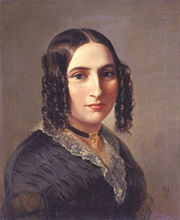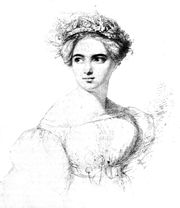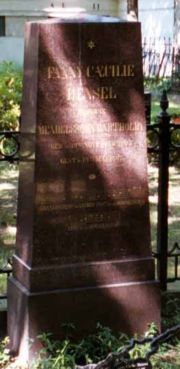
Fanny Mendelssohn
Encyclopedia

Germany
Germany , officially the Federal Republic of Germany , is a federal parliamentary republic in Europe. The country consists of 16 states while the capital and largest city is Berlin. Germany covers an area of 357,021 km2 and has a largely temperate seasonal climate...
pianist
Pianist
A pianist is a musician who plays the piano. A professional pianist can perform solo pieces, play with an ensemble or orchestra, or accompany one or more singers, solo instrumentalists, or other performers.-Choice of genres:...
and composer
Composer
A composer is a person who creates music, either by musical notation or oral tradition, for interpretation and performance, or through direct manipulation of sonic material through electronic media...
, the sister of the composer Felix Mendelssohn
Felix Mendelssohn
Jakob Ludwig Felix Mendelssohn Barthóldy , use the form 'Mendelssohn' and not 'Mendelssohn Bartholdy'. The Grove Dictionary of Music and Musicians gives ' Felix Mendelssohn' as the entry, with 'Mendelssohn' used in the body text...
and granddaughter of the philosopher Moses Mendelssohn
Moses Mendelssohn
Moses Mendelssohn was a German Jewish philosopher to whose ideas the renaissance of European Jews, Haskalah is indebted...
. She was the grandmother of the philosopher Paul Hensel
Paul Hensel
----Paul Hugo Hensel was a German philosopher, son of the landowner and entrepreneur Sebastian Hensel, brother of the mathematician Kurt Hensel , grandson of the composer Fanny Mendelssohn and the painter Wilhelm Hensel, and a descendant of the philosopher Moses Mendelssohn.Hensel was born in...
and the mathematician Kurt Hensel
Kurt Hensel
Kurt Wilhelm Sebastian Hensel was a German mathematician born in Königsberg, Prussia.He was the son of the landowner and entrepreneur Sebastian Hensel, brother of the philosopher Paul Hensel, grandson of the composer Fanny Mendelssohn and the painter Wilhelm Hensel, and a descendant of the...
.
Life

Hamburg
-History:The first historic name for the city was, according to Claudius Ptolemy's reports, Treva.But the city takes its modern name, Hamburg, from the first permanent building on the site, a castle whose construction was ordered by the Emperor Charlemagne in AD 808...
, the oldest of four children
Mendelssohn family
The Mendelssohn family are the descendants of the German Jewish philosopher Moses Mendelssohn, and include his grandson, the composer Felix Mendelssohn....
. She was descended on both sides from distinguished Jewish families; her parents were Abraham Mendelssohn (who was the son of philosopher Moses Mendelssohn and later changed the family surname to Mendelssohn Bartholdy), and Lea, née Salomon, a granddaughter of the entrepreneur Daniel Itzig
Daniel Itzig
Daniel Itzig was a Court Jew of Kings Frederick II the Great and Frederick William II of Prussia....
. She was not however brought up as Jewish, and never practised Judaism.
Fanny shared the early musical education and upbringing of her younger brother Felix, including tuition from Carl Friedrich Zelter
Carl Friedrich Zelter
Carl Friedrich Zelter was a German composer, conductor and teacher of music.Zelter became friendly with Johann Wolfgang von Goethe, and his works include settings of Goethe's poems...
. The siblings shared a great passion for music. Like Felix (who was born in 1809), Fanny showed prodigious musical ability as a child and began to write music. Visitors to the Mendelssohn household in the early 1820s, including Ignaz Moscheles
Ignaz Moscheles
Ignaz Moscheles was a Bohemian composer and piano virtuoso, whose career after his early years was based initially in London, and later at Leipzig, where he succeeded his friend and sometime pupil Felix Mendelssohn as head of the Conservatoire.-Sources:Much of what we know about Moscheles's life...
and Sir George Smart
George Thomas Smart
Sir George Thomas Smart was an English musician.Smart was born in London, his father being a music-seller. He was a choir-boy at the Chapel Royal, and was educated in music, becoming an expert violinist, organist, teacher of singing and conductor...
, were equally impressed by both siblings. She may also have been influenced by the role-models of her great-aunts Fanny von Arnstein
Fanny von Arnstein
Baroness Franziska "Fanny" von Arnstein, born Vögele Itzig was a leader of society in Vienna....
and Sarah Levy, both lovers of music, the former the patroness of a well-known salon
Salon (gathering)
A salon is a gathering of people under the roof of an inspiring host, held partly to amuse one another and partly to refine taste and increase their knowledge of the participants through conversation. These gatherings often consciously followed Horace's definition of the aims of poetry, "either to...
and the latter a skilled keyboard player in her own right.
However, Fanny was limited by prevailing attitudes of the time toward women, attitudes apparently shared by her father, who was tolerant, rather than supportive, of her activities as a composer. Her father wrote to her in 1820 "Music will perhaps become his [i.e. Felix's] profession, while for you it can and must be only an ornament". On the other hand, Felix was supportive of her, as a composer and a performer, although cautious (professedly for family reasons) of her publishing her works under her own name. He did however arrange with her for a number of her songs to be published under his own name. In turn Fanny helped Felix by constructive criticism of pieces, which he always considered very carefully.
In 1829, after a courtship of several years, Fanny married the painter
Painting
Painting is the practice of applying paint, pigment, color or other medium to a surface . The application of the medium is commonly applied to the base with a brush but other objects can be used. In art, the term painting describes both the act and the result of the action. However, painting is...
Wilhelm Hensel
Wilhelm Hensel
Wilhelm Hensel was a German painter, brother of Luise Hensel, husband to Fanny Mendelssohn, and brother-in-law to Felix Mendelssohn....
and the following year she had her only child, Sebastian Ludwig Felix Hensel.
Her husband was supportive of her composing. Subsequently, her works were often played alongside her brother's at the family home in Berlin
Berlin
Berlin is the capital city of Germany and is one of the 16 states of Germany. With a population of 3.45 million people, Berlin is Germany's largest city. It is the second most populous city proper and the seventh most populous urban area in the European Union...
in a sunday concert series (Sonntagskonzerte), which was originally organized by Fanny's father, and after 1831 carried on by Fanny herself. Her public debut at the piano (and only known public performance) came in 1838, when she played her brother's Piano Concerto No. 1
Piano Concerto No. 1 (Mendelssohn)
Mendelssohn's Piano Concerto No. 1 in G minor was written in 1830–1, around the same time as his fourth symphony , and premiered in Munich in October 1831. He had already written a piano concerto in A minor with string accompaniment and two concertos with two pianos...
. In 1846, she decided, without consulting Felix, to publish a collection of her songs (as her op. 1).

Berlin
Berlin is the capital city of Germany and is one of the 16 states of Germany. With a population of 3.45 million people, Berlin is Germany's largest city. It is the second most populous city proper and the seventh most populous urban area in the European Union...
in 1847 of complications from a stroke
Stroke
A stroke, previously known medically as a cerebrovascular accident , is the rapidly developing loss of brain function due to disturbance in the blood supply to the brain. This can be due to ischemia caused by blockage , or a hemorrhage...
suffered while rehearsing one of her brother's oratorio
Oratorio
An oratorio is a large musical composition including an orchestra, a choir, and soloists. Like an opera, an oratorio includes the use of a choir, soloists, an ensemble, various distinguishable characters, and arias...
s, The First Walpurgis Night. Felix himself died less than six months later from the same cause (which was also responsible for the deaths of both of their parents and of their grandfather Moses), but not before writing his String Quartet No. 6 in F minor
String Quartet No. 6 (Mendelssohn)
The String Quartet No. 6 in F minor, Op. 80, was composed by Felix Mendelssohn in 1847 and is essentially his last major composition...
in memory of his sister.
In recent years, her music has become better known thanks to concert performances and a number of CD
Compact Disc
The Compact Disc is an optical disc used to store digital data. It was originally developed to store and playback sound recordings exclusively, but later expanded to encompass data storage , write-once audio and data storage , rewritable media , Video Compact Discs , Super Video Compact Discs ,...
s being released on labels such as Hyperion
Hyperion Records
Hyperion Records is an independent British classical record label.-History:The company was named after Hyperion, one of the Titans of Greek mythology. It was founded by George Edward Perry, widely known as "Ted", in 1980. Early LP releases included rarely recorded 20th century British music by...
and CPO
CPO
-Officers:* Chief Performance Officer of the United States* Chief Petty Officer, a military rank* Chief privacy officer, an executive responsible for managing issues of privacy laws and policies...
. Her reputation has also been advanced by those researching female musical creativity, of which she is one of the relatively few well-documented exemplars in the early 19th century.
Music
Fanny Mendelssohn composed 466 pieces of music. Her compositions include a piano trio
Piano trio
A piano trio is a group of piano and two other instruments, usually a violin and a cello, or a piece of music written for such a group. It is one of the most common forms found in classical chamber music...
and several books of solo piano
Piano
The piano is a musical instrument played by means of a keyboard. It is one of the most popular instruments in the world. Widely used in classical and jazz music for solo performances, ensemble use, chamber music and accompaniment, the piano is also very popular as an aid to composing and rehearsal...
pieces and song
Song
In music, a song is a composition for voice or voices, performed by singing.A song may be accompanied by musical instruments, or it may be unaccompanied, as in the case of a cappella songs...
s. A number of her songs were originally published under Felix's name in his opus
Opus number
An Opus number , pl. opera and opuses, abbreviated, sing. Op. and pl. Opp. refers to a number generally assigned by composers to an individual composition or set of compositions on publication, to help identify their works...
8 and 9 collections. One of these songs, "Italy", was a favourite of Queen Victoria, who thought Felix had written it. Her piano works are often in the manner of songs, and many carry the name Lied ohne Worte (Song without Words). This style (and title) of piano music was most successfully developed by Felix Mendelssohn, though some modern scholars assert that Fanny may have preceded him in the genre.
She also wrote, amongst other works for the piano, a cycle of pieces depicting the months of the year, Das Jahr ("The Year"). The music was written on coloured sheets of paper, and illustrated by her husband Wilhelm . Each piece was also accompanied by a short poem.
In a letter from Rome
Rome
Rome is the capital of Italy and the country's largest and most populated city and comune, with over 2.7 million residents in . The city is located in the central-western portion of the Italian Peninsula, on the Tiber River within the Lazio region of Italy.Rome's history spans two and a half...
, Fanny Mendelssohn described the process behind composing Das Jahr:
I have been composing a good deal lately, and have called my piano pieces after the names of my favourite haunts, partly because they really came into my mind at these spots, partly because our pleasant excursions were in my mind while I was writing them. They will form a delightful souvenir, a kind of second diary. But do not imagine that I give these names when playing them in society, they are for home use entirely.
Published sources
- Fanny Mendelssohn's son Sebastian Hensel edited the family correspondence as The Mendelssohn Family 1729-1847 (tr. into English, 4th revised edition 1884) which still remains an important source of information about Fanny, Felix and their relatives.
- Fanny's correspondence with Felix has been translated into English and edited by Marcia Citron: The Letters of Fanny Hensel to Felix Mendelssohn (New York, 1987).
- R. Larry Todd's Mendelssohn: A Life in Music (Oxford University PressOxford University PressOxford University Press is the largest university press in the world. It is a department of the University of Oxford and is governed by a group of 15 academics appointed by the Vice-Chancellor known as the Delegates of the Press. They are headed by the Secretary to the Delegates, who serves as...
, 2003) ISBN 0-19-511043-9 is the most recent comprehensive survey of Felix and contains much information about Fanny.
- The Mendelssohns: Their Music in History edited by John Michael Cooper & Julie D. Prandi (Oxford University Press, 2002) contains material on both composers.
- R. Larry Todd Fanny Hensel: The Other Mendelssohn (Oxford University Press, 2010) ISBN 978-0-19-518080-0
Other references
- Citron, Marcia J. Mendelssohn, Fanny In Grove Music Online (subscriber access). Oxford Music Online, (accessed February 13, 2010).
- Kimber, Marian Wilson, "The 'Suppression' of Fanny Mendelssohn: Rethinking Feminist Biography," 19th-Century Music, Vol. 26, No. 2 (Autumn, 2002), pp. 113–129
- Sterndale Bennett, R., "The Death of Mendelssohn", in Music and Letters vol. 36 no.4, Oxford, 1955
- Tillard, Françoise, translated by Camille Naish, Fanny Mendelssohn , Amdeus Press, Portland, Oregon, c1996, ISBN 0931340969
External links
- FannyHensel.de - comprehensive site
- Hensel-Biography - some notes about the composer and her family
- Fanny Mendelssohn Hensel Piano Trio in d minor sound-bites and short bio
- Klavierstücke for piano four hands, in youtube

